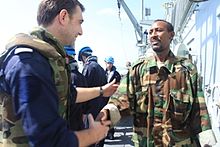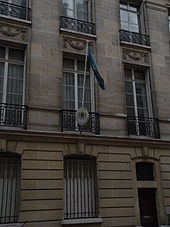- Transitional Federal Government
-
Somalia 
This article is part of the series:
Politics and government of
Somalia
- Executive
- Transitional Federal Government
- President
- Prime Minister
- Abdiweli Mohamed Ali
- Ministry of Defense
- Council of Ministers
- States
- Puntland
- Galmudug
- Maakhir
- Awdalland
- Hiiraan State
- Somaliland
(de facto independent state)- Politics of Somaliland
The Transitional Federal Government (TFG; Somali: Dowladda federaalka kumeelgaarka) is the current internationally recognized government of the Republic of Somalia. It was established as one of the Transitional Federal Institutions (TFIs) of government as defined in the Transitional Federal Charter (TFC) adopted in November 2004 by the Transitional Federal Parliament (TFP).
The Transitional Federal Government officially comprises the executive branch of government, with the TFP serving as the legislative branch. The government is headed by the President of Somalia, to whom the cabinet reports through the Prime Minister. However, it is also used as a general term to refer to all three branches collectively.
The various departments of government, such as the Ministry of Defence, fall under the different cabinet portfolios.
Backed by the United Nations, the African Union as well as the United States, the government is currently battling Al Shabaab insurgents to assume full control of the southern part of the country. As of August 2011, the government and its AMISOM allies have managed to secure control over all of Mogadishu.[1] According to the AU and Prime Minister Mohamed Abdullahi Mohamed, with increasing troop strength, the pace of territorial gains is expected to greatly accelerate.[2][3]
The mandate for the transitional government was to run out in August 2011, by which time it was expected that Somali should, ideally have a new and permanent Constitution. Intense international criticism put pressure on the Somali government to act.[4] At the beginning of February 2011, the Somali parliament voted a three year extension for itself, and announced plans to hold elections in July or August 2011.[5]
Contents
Structure
The legal structure in Somalia is divided along three lines: civil law, religious law, and traditional clan law.
Civil law
While Somalia's formal judicial system was largely destroyed after the fall of the Siad Barre regime, it has been rebuilt and is now administered under different regional governments such as the autonomous Puntland and Somaliland macro-regions. In the case of the Transitional Federal Government (TFG), a new judicial structure was formed through various international conferences.
Despite some significant political differences between them, all of these administrations share similar legal structures, much of which are predicated on the judicial systems of previous Somali administrations. These similarities in civil law include:[6]
- A charter which affirms the primacy of shari'a or Islamic law, although in practice shari'a is applied mainly to matters such as marriage, divorce, inheritance and civil issues.
- The charter guarantees respect for universal standards of human rights to all subjects of the law. It also assures the independence of the judiciary, which in turn is protected by a judicial committee.
- A three-tier judicial system including a supreme court, a court of appeals, and courts of first instance (either divided between district and regional courts, or a single court per region).
- The laws of the civilian government which were in effect prior to the military coup d'état that saw the Barre regime into power remain in force until the laws are amended.
Constitution
Main article: Transitional Federal Charter of the Somali RepublicThe Transitional Federal Charter of the Somali Republic serves as the constitution of Somalia. It lays out the basic way in which the government is to operate.
Council of Ministers
Main article: Somali Council of MinistersThe cabinet, formally known as the Council of Ministers, at first comprised 42 offices, but was later slimmed down to 31 portfolios during a period of contention in 2006. In 2010, it was further scaled down to 18 posts. The Council of Ministers is appointed by the Prime Minister. The current government posts and ministerial positions are as follows:
Cabinet Position Office Holder Minister of Foreign Affairs Mahamed Mahamud Haji Ibrahim Minister of Defence husein Rrab isse Minister of Planning & ineternational Co-operation Abdullahi Goodah Barre Minister of Justice & Religious Issues Ahmed Hasan Gabobe (Ugas Bille) Minister of Interior Affairs & National Security Abdisamad Mallin Mahamud Sheikh hasan Minister of Finance & Treasury Dr. Abdinaasir Mahamed Abdulle Minister of Women & Family Affairs Casho ismaan Aqil Minister of Agriculture & Livestock Abullahi Haaji Hasan Mahamed Nur Minister of Health Dr. Abdicasiis Sheikh Yusuf Minister of Information, Posts & Telecommunication Abdulqaadir Mahamed Ahmed Minister of Employment, Youth & sports Mahamed Muhiyadin Sheikh Mursal Minister of Fisheries Abdiraxmaan Sheikh Ibrahim Minister of Transport & Ports Adan Abdullaahi Adan Minister of Federal Constitution & Reconsiliation Abdiraxmaan Hosh Jibril Minister of General Affairs, Housing & Reconstruction Jaylani Nur Iikar Minister of Water,Minerals & Energy Abdulqaadir Maxamed Dhiaisow Minister of Education & Culture Prof. Axmed Aydiid Ibrahim Minister of Trade & Industry Abdiwahaab Ugas Huseen Ugas Khalif Executive branch
Main articles: List of Presidents of Somalia and Prime Minister of SomaliaA President is elected by Parliament. The President is head of government, and chooses the Prime Minister, who leads the cabinet. The current President is Sharif Ahmed. The current Prime Minister is Abdiweli Mohamed Ali, who took office on June 19, 2011.
Parliament
Main article: Transitional Federal ParliamentThe Transitional Federal Parliament elects the President and Prime Minister, and has the authority to pass and veto laws. It is also in charge of governance and administration of Mogadishu. Each of the four major clans hold 61 seats, while an alliance of minority clans hold 31 seats. After an alliance with the Islamic Courts Union and other Islamist groups was formed, the Islamists were awarded 200 seats. Representatives of citizens' groups and representatives of the Somali diaspora hold 75 seats. By law, at least 12% of all representatives must be women. Members of parliament are selected through traditional clan leaders or shura councils. General elections are being planned.
Judiciary
Main article: Judiciary of SomaliaUnder the Transitional Federal Government, a Supreme Court based in Mogadishu was established, as well as an Appeals Court. Smaller local courts were also established. A Judicial Service Council directs all judiciary and advises the president. All Sharia courts established by the ICU were discontinued, but Islamic prinicples are to be used in TFG courts.
State governments
Main articles: Politics of Puntland and Politics of SomalilandUnder the Transitional Federal Government, local state governments maintain some power over their affairs and maintain their own police and security forces, but are subject to the authority of the Transitional Federal Government.
Education
Main article: Education in SomaliaThe Ministry of Education is officially responsible for education in Somalia, with about 15% of the government's budget being spent on education. However, in practice, the education system is now largely private. In 2006, the autonomous Puntland region in the northeast was the second territory in Somalia after the Somaliland region to introduce free primary schools, with teachers now receiving their salaries from the Puntland administration.[7] As of 2007, primary schools have also seen a 28% increase in enrollment over the preceding three years.[8] In addition, several universities in Somalia, including Mogadishu University, have been scored among the 100 best universities in Africa in spite of the harsh environment, which has been hailed as a triumph for grass-roots initiatives.[9]
Healthcare
The Ministry of Health heads the country's healthcare system. The current Minister of Health is Qamar Adan Ali.[10] The autonomous Puntland region has its own Ministry of Health, which is headed by Dr. Mohamed Bashir Ali Bihi,[11] as does the Somaliland region in northwestern Somalia, with its Ministry of Health led by Osman Bile Ali.[12]
Media
The federal government has two main media outlets: Radio Mogadishu, the state-run radio station; and Somali National Television, the national television channel.
Military and police
Main article: Military of SomaliaUp to 1991 the Military of Somalia included a Somali Air Corps, and the Somali Navy. Today the Transitional Federal Government maintains an army of 10,000 soldiers,[citation needed] with the Ministry of Defense being responsible for the Armed Forces. It controls only a small part of the country. Its weapons arsenal consists of:
Technicals are the only fighting vehicle in service.
In June 2009, the Somali Navy was re-established. Up to 500 Marines began training in Mogadishu, with the force expected to reach 5,000 men. The Somali Navy will be based in Puntland. The current commander is Admiral Farah Omar Ahmed. There are also plans for the re-establishment of the Somali Air Force. Two combat planes have already been purchased.
In addition, a new police force was re-established to maintain law and order. The first police academy to be built in Somalia for several years also opened on December 20, 2005 at Armo, 100 kilometres south of Bosaso.[13] The Somali police also has a criminal investigations department in Mogadishu.
The autonomous Puntland and Somaliland regions within Somalia have their own security forces.
Capital
 The skyline of Mogadishu.
The skyline of Mogadishu. Main article: Mogadishu
Main article: MogadishuAs with previous Somali administrations, the Transitional Federal Charter of the Somali Republic recognizes Mogadishu as the capital of Somalia. The Parliament of Somalia meets in the city, which is also the seat of the nation's Supreme Court. In addition, Mogadishu is the location of the presidential palace, Villa Somalia, where the President resides. The Prime Minister also lives in the city. As the largest city in Somalia, Mogadishu has a population of over 2 million people.[14] Prior to the civil war, it was known as the "White Pearl of the Indian Ocean".[15]
History
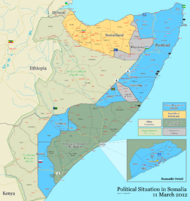 Map of Somalia May 2011 prior to government expansion, with the blue areas being under control of the Transitional Federal Government and the autonomous region of Puntland, the yellow area being the secessionist region of Somaliland, and the rest being held by Islamist militias.
Map of Somalia May 2011 prior to government expansion, with the blue areas being under control of the Transitional Federal Government and the autonomous region of Puntland, the yellow area being the secessionist region of Somaliland, and the rest being held by Islamist militias.
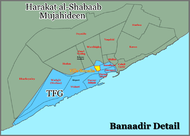 Map of Mogadishu as of November 2010, with the blue being controlled by the Transitional Federal Government, and the green being held by al-Shabaab.
Map of Mogadishu as of November 2010, with the blue being controlled by the Transitional Federal Government, and the green being held by al-Shabaab.
The Transitional Federal Government (TFG) of the Republic of Somalia is the most recent attempt to restore national institutions to Somalia after the 1991 collapse of the Siad Barre regime and the ensuing Somali Civil War. Established in 2004 and internationally recognized, its support in Somalia was waning until the United States-backed 2006 intervention by the Ethiopian military, which helped drive out the rival Islamic Courts Union (ICU) in Mogadishu and solidify the TFG's rule.[16]
Between May 31 and June 9, 2008, representatives of Somalia's federal government and the moderate Alliance for the Re-liberation of Somalia (ARS) group of Islamist rebels participated in peace talks in Djibouti brokered by the former United Nations Special Envoy to Somalia, Ahmedou Ould-Abdallah. The conference ended with a signed agreement calling for the withdrawal of Ethiopian troops in exchange for the cessation of armed confrontation. Parliament was subsequently expanded to 550 seats to accommodate ARS members, which then elected Sheikh Sharif Sheikh Ahmed, the former ARS chairman, to office. President Sharif shortly afterwards appointed Omar Abdirashid Ali Sharmarke, the son of slain former President Abdirashid Ali Sharmarke, as the nation's new Prime Minister.[17]
With the help of a small team of African Union troops, the coalition government also began a counteroffensive in February 2009 to retake control of the southern half of the country. To solidify its control of southern Somalia, the TFG formed an alliance with the Islamic Courts Union, other members of the Alliance for the Re-liberation of Somalia, and Ahlu Sunna Waljama'a, a moderate Sufi militia.[18] Furthermore, Al-Shabaab and Hizbul Islam, the two main Islamist groups in opposition, began to fight amongst themselves in mid-2009.[19]
As a truce, in March 2009, Somalia's newly established coalition government announced that it would re-implement Shari'a as the nation's official judicial system.[20] However, conflict continues in the southern and central parts of the country between government troops and extremist Islamist militants with links to al-Qaeda.[21]
On October 14, 2010, diplomat Mohamed Abdullahi Mohamed was appointed the new Prime Minister of Somalia. The former Premier Omar Abdirashid Ali Sharmarke resigned the month before following a protracted dispute with President Sharif over a proposed draft constitution.[22]
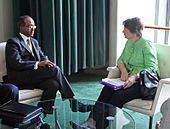 Foreign Minister of Somalia Mohamed Abdullahi Omaar in a meeting with UNDP Administrator Helen Clark and other diplomats at the UN headquarters in New York.
Foreign Minister of Somalia Mohamed Abdullahi Omaar in a meeting with UNDP Administrator Helen Clark and other diplomats at the UN headquarters in New York.
Per the Transitional Federal Government's (TFG) Charter,[23] Prime Minister Mohamed named a new Cabinet on November 12, 2010,[24] which has been lauded by the international community.[25][26] The allotted ministerial positions were reduced from 39 to 18.[24][27] Only two Ministers from the previous Cabinet were reappointed: Hussein Abdi Halane, the former Minister of Finance and a well-regarded figure in the international community,[28] was put in charge of a consolidated Ministry of Finance and Treasury; and Dr. Mohamud Abdi Ibrahim remained the minister of Commerce and Industry.[28] Ahlu Sunna Waljama'a, a moderate Sufi group and an important military ally of the TFG, was also accorded the key Interior and Labour ministries.[27][28] The remaining ministerial positions were largely assigned to technocrats new to the Somali political arena.[29]
The Transitional Federal Government continues to reach out to both Somali and international stakeholders to help grow the administrative capacity of the Transitional Federal Institutions and planned to work toward eventual national elections in 2011,[30] when the interim government's mandate expires.[2][30] A national election committee is also being organized to oversee the transition to a representative government.[31]
International relations
Main article: Foreign relations of SomaliaThe Transitional Federal Government is internationally recognized as the official government of Somalia. It currently occupies Somalia's seat in the United Nations, the African Union, and the Organisation of Islamic Cooperation (OIC). The Permanent Representative of Somalia to the United Nations is Elmi Ahmed Duale. The Deputy Permanent Representative is Idd Beddel Mohamed. Somalia is one of the founding members of the OIC. The TFG also has ambassadors in other countries.
The Transitional Federal Government currently maintains embassies in 19 countries. Ethiopia maintains an embassy in Mogadishu,[32] and consulates in Hargeisa in Somaliland and in Garowe in Puntland.[33][34] Djibouti re-opened its embassy in Mogadishu in December 2010.[35] The following year, India also re-opened its embassy in the capital after a twenty year absence.[36] Italy maintains a special diplomatic delegation and a Technical Mission to Mogadishu, and is scheduled to re-open its embassy in the city.[37] In 2011, the United Kingdom likewise announced plans to re-open its embassy in Mogadishu.[38]
Passports
For travel, Somali citizens can obtain a Somali passport from government-designated locations or from Somali embassies abroad.
References
- ^ http://english.aljazeera.net/video/africa/2011/08/20118655455968226.html
- ^ a b Security Council Meeting on Somalia
- ^ Making Gains - AMISOM forces take new territory
- ^ Term Extended for Somali Parliament Amid Sharp International Criticism
- ^ Somali Parliament Extends Term
- ^ Dr Andre Le Sage (2005-06-01). "Stateless Justice in Somalia". Centre for Humanitarian Dialogue. http://www.hdcentre.org/files/Somalia%20report.pdf. Retrieved 2009-06-26.
- ^ Staff writer, Staff writer (2006 04 06). "Puntland (Somalia) to introduce free primary schools". Afrol News. http://www.afrol.com/articles/16083. Retrieved 2007-02-09.
- ^ Ihebuzor, Noel (2005 01 31). "EC and UNICEF join hands to support education in Somalia". United Nations Children's Fund (UNICEF). http://www.reliefweb.int/rw/RWB.NSF/db900SID/VBOL-696HBA?OpenDocument. Retrieved 2007-02-09.
- ^ The Role of Islamic NGOs and Charities in a Stateless Country: The Case of Somalia by Valeria Saggiomo.
- ^ WHO EMRO - THE REGIONAL OFFICE AND ITS PARTNERS - Somalia
- ^ Ministry of Health - Puntland State of Somalia
- ^ Somaliland - Government Ministries
- ^ New Police Academy Opens in Somalia
- ^ Mogadishu
- ^ Al J. Venter, Africa Today, (1975), p. 152.
- ^ Ethiopian Invasion of Somalia
- ^ "Somalia". World Factbook. Central Intelligence Agency. 2009-05-14. https://www.cia.gov/library/publications/the-world-factbook/geos/so.html. Retrieved 2009-05-31.
- ^ kamaal says: (2010-05-22). "UN boss urges support for Somalia ahead of Istanbul summit". Horseedmedia.net. http://horseedmedia.net/2010/05/un-boss-urges-support-for-somalia-ahead-of-istanbul-summit/. Retrieved 2010-06-27.
- ^ "Islamists break Somali port truce". BBC News. 2009-10-21. http://news.bbc.co.uk/2/hi/africa/8318798.stm. Retrieved 2010-06-27.
- ^ Shariah in Somalia – Arab News
- ^ Yahoo! News, 15 September 2009
- ^ Somali-American is new prime minister in Somalia
- ^ "Approves Somalia’s New PM After Repeated Delays". Allheadlinenews.com. 2010-10-31. http://www.allheadlinenews.com/articles/7020386438?Parliament. Retrieved 2010-12-30.
- ^ a b New Somali Prime Minister Unveils Smaller Cabinet
- ^ Somali Prime Minister Unveiled His Cabinet
- ^ "Somali Lawmakers Pass Proposed Cabinet". Cbsnews.com. http://www.cbsnews.com/stories/2010/11/27/ap/africa/main7094041.shtml. Retrieved 2010-12-30.[dead link]
- ^ a b Somali PM unveils leaner cabinet
- ^ a b c "Somali Premier Unveils New Cabinet". Garoweonline.com. 2010-11-12. http://www.garoweonline.com/artman2/publish/Somalia_27/Somali_Premier_Unveils_New_Cabinets.shtml. Retrieved 2010-12-30.
- ^ "Somali PM names new cabinet". News.xinhuanet.com. 2010-11-13. http://news.xinhuanet.com/english2010/world/2010-11/13/c_13604352.htm. Retrieved 2010-12-30.
- ^ a b Central Intelligence Agency, The CIA World Factbook 2010, Book 2010, (Skyhorse Publishing Inc.: 2009), p.620.
- ^ Somalia: Parliament Speaker plans committee for presidential elections
- ^ We urgently need an Embassy in Somalia
- ^ FBI investigates Somalis in Minneapolis
- ^ SOMALIA: Ethiopia opens consulate in Puntland
- ^ Djibouti Government Opens its Embassy in Mogadishu
- ^ Somalia: India Reopens Its Embassy in Country After 20 Years
- ^ Italy first in West to reopen embassy in Somalia
- ^ SOMALIA: The Puntland State Minister for Planning and International Cooperation meets High Ranking European Ministers amid official Visit to the UK and the Netherland
External links
Categories:- Politics of Somalia
- 2004 establishments
- Government of Somalia
- Somali Civil War
- Executive
Wikimedia Foundation. 2010.

